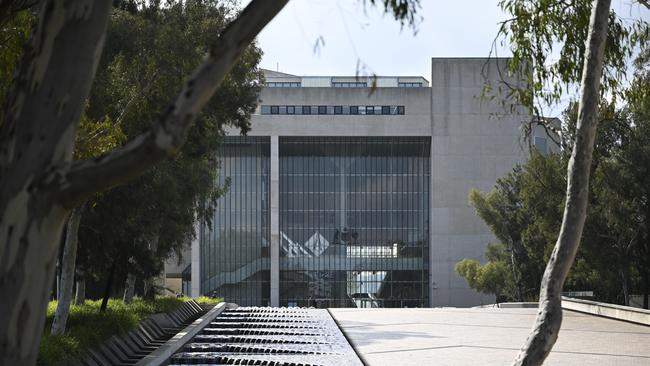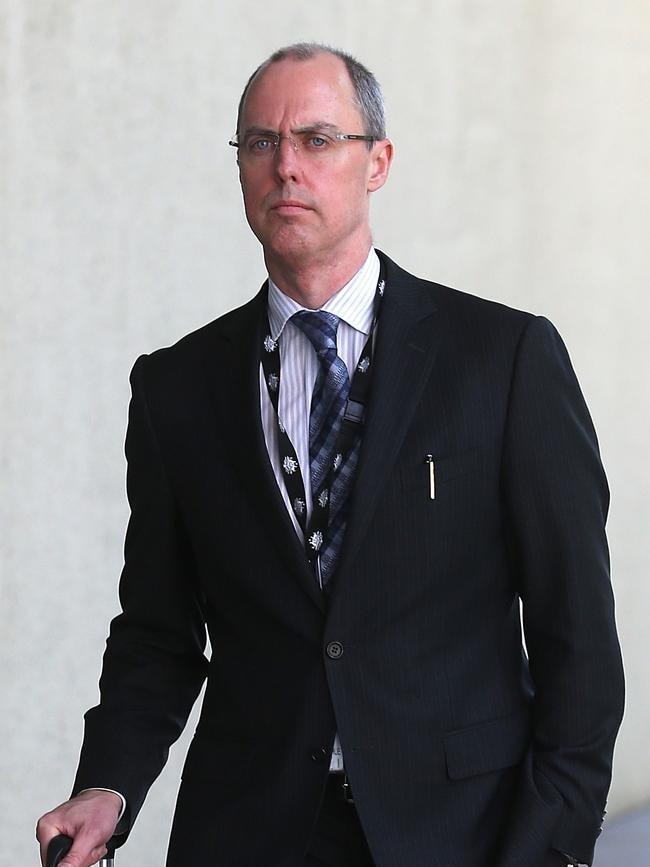YBFZ case: Ex-detainee who stabbed three people challenges curfew, ankle bracelet conditions
A dangerous ex-detainee at the centre of the High Court’s latest constitutional challenge stabbed at least three people, was convicted of burglary, set a property on fire and has ‘unmanaged’ serious mental health issues.

A dangerous ex-detainee at the centre of the High Court’s latest constitutional challenge stabbed at least three people, was convicted of burglary, set a property on fire and has “unmanaged” serious mental health issues.
In the latest landmine for the Albanese government in the fallout of the NZYQ debacle, Solicitor-General Stephen Donaghue KC told the full bench of the High Court last week the Eritrean-born man known as YBFZ should be subject to strict monitoring conditions because he poses a “risk of harm to the community”.
But his lawyers say the conditions imposed through his visa – which include wearing a large ankle bracelet and having a nightly curfew – infringe on his liberty, and argue the government is inflicting punitive measures on him that are contrary to the Constitution.
If YBFZ is successful in his bid to have the surveillance requirements overturned, a leading constitutional expert says it could lead to a wave of litigation from other immigration lawyers attempting to challenge monitoring conditions imposed by the government.
YBFZ, who fled from religious persecution and came to Australia in 2002 as a 14-year-old, had his visa cancelled in late 2017 and entered into immigration detention.
He was released last year along with 150 other criminals under the High Court’s NZYQ decision which found indefinite detention unconstitutional.
Mr Donaghue told the High Court last week that YBFZ had an extensive criminal history, which was taken into account by Labor’s Community Protection Board in determining the monitoring conditions to accompany his bridging visa.
“It includes at the start of the list in October 2006 malicious wounding, where he used a weapon to inflict significant injury by stabbing two people, one requiring ‘exploratory surgery and a chest drain’,” he told the court.
“Then there is a number of various other criminal damage, threat to kill, various other offences, assault, arson. Then, in 2017, convicted of burglary and recklessly cause injury. Sentenced to 18 months.”
YBFZ has been diagnosed with schizophrenia.
“So, this is a man who has unmanaged mental health issues whose criminal history includes stabbing at least three different people, including having entered homes after-hours to do so, and a whole raft of other offending,” Mr Donaghue said.
He argued the conditions of YBFZ’s bridging visa were “not about punishing” but simply about “providing a mechanism to protect the Australian community”.
But YBFZ’s lawyer, Craig Lenehan SC, told the court the conditions were punitive because they infringed on his client’s liberty and bodily integrity. He argued only courts – not governments – were permitted to punish under the separation of powers.
He said YBFZ’s 10pm-6am curfew involved “detention” and has a “punitive effect” because “it affects a significant infringement of liberty”. “The concern is, we say, the authorisation of detention by the executive,” he said. Mr Lenehan described YBFZ’s ankle bracelet as a “scarlet letter” which “marks him out as somebody who has done something wrong”.
While Mr Donaghue submitted YBFZ could “wear long clothing” to hide the device, Mr Lenehan said that would be “a further affront to his right of bodily integrity in that he has to wear certain sorts of clothing to conceal something that he finds offensive”.
“The effect ... is that my client does not control what is done with his body,” he said. “That is not a momentary loss of control on his part, it is a constant one that will endure for a year or more, and during that time, your Honours have my point about the public stigma attached to ankle monitors.”

The High Court, when hearing the matter in Darwin, got a rare glimpse into the operation of the Community Protection Board, set up by the government in the wake of the NZYQ decision.
The court heard that the board assessed more than 100 pages of detailed notes as to YBFZ’s “medical history, his criminal history, his history in immigration detention, all sorts of matters of that kind”.
“The individual presents serious mental health issues and ... the board remains concerned that the individual presents a risk to the safety of the community,” the CPB found, in determining YBFZ’s monitoring conditions.
Constitutional law expert Greg Craven said the High Court must determine whether each individual surveillance measure wais considered a punishment or not.
“If you look at it with the ankle bracelet – it’s having to wear something, it’s intrusive, it allows your every move to be monitored, I would have thought that comes very close to being punishment,” he said, adding that it would be “perfectly possible” for the court to find some measures as punishment, and others not.
If YBFZ were successful, Mr Craven said it would likely result in a wave of new cases challenging monitoring conditions.
“What would happen is immigration lawyers would look and it and say ‘well, they’ve just knocked off ankle bracelets – what’s closest, let’s try challenge that’,” he said.





